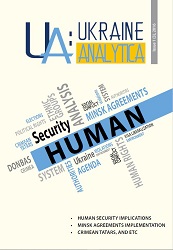Do Visa Liberalisation Reforms Help Modernizing Ukraine?
Do Visa Liberalisation Reforms Help Modernizing Ukraine?
Author(s): Maryana Kuzio, Iryna SushkoSubject(s): Civil Society, International relations/trade, Security and defense, EU-Approach / EU-Accession / EU-Development, Corruption - Transparency - Anti-Corruption, Peace and Conflict Studies, Asylum, Refugees, Migration as Policy-fields, Russian Aggression against Ukraine
Published by: PIC Promotion of the Intercultural Cooperation
Keywords: Visa Liberalisation Reforms; Ukraine; EU;
Summary/Abstract: Though Ukraine has never been so close to getting a visa-free regime with the EU, till recently the process could still be delayed or even disrupted. The EU has been taking the final decision not only based on technical criteria envisaged by the Visa Liberalization Action Plan (VLAP)1 but also taking into account the factors of security and migration risks, raised from the latest refugee crisis in the European Union and due to the conflict in the east of Ukraine. The VLAP appeared to be one of the most effective stimuli for Ukraine to advance reforms in the sphere of fight against corruption, security of documents and migration management. The result of an independent survey, conducted by the Civic Organization “Europe without Barriers” (EWB) revealed that the three abovementioned issues appeared to be in the focus of the EU policy makers and NGOs with regard to the abolition of the visa regime with Ukraine. Overall, interviewees saw corruption as the key problem, acknowledging that it is much harder to fight corruption than to introduce new laws or passports. Corruption is seen as the factor undermining success in many different parts of the VLAP: “The best border control does not help if the guards are not earning enough money or view their service as something they can sell.”2 The armed conflict in the east of Ukraine brought into the focus the issue of document security. EU countries express their concern regarding the entry of terrorist and armed radical groups to the territories of EU with Ukrainian passports3. The visa liberalization mechanism gives the opportunity to enhance documents’ security by introducing biometric data for the travel and identification documents. As found during EWB external survey4, some migration stereotypes about Ukraine circulating in the European Union’s Member States could come up as a threat to the political support of visa liberalisation to Ukraine. It is thought that this would lead to more poverty and an increasing number of internally displaced persons (IDPs) in Ukraine, motivating more Ukrainians to try to get to the European Union. Also, the high number of approximately 1.6 million IDPs may lead to the conclusion that they will not be able to return to their homes anytime soon, making emigration an interesting option for them. In this context, Ukraine’s progress in reforms within the visa liberalization process appeared to be under the close look of the EU. Ukraine needs to demonstrate real steps towards fighting corruption as well as regulating the security situation and migration flows.
Journal: Ukraine Analytica
- Issue Year: 2/2016
- Issue No: 01 (3)
- Page Range: 71-76
- Page Count: 6
- Language: English

